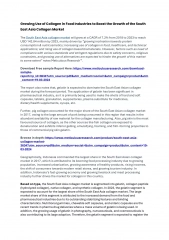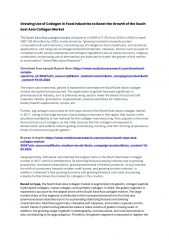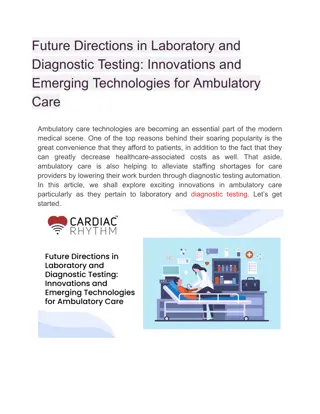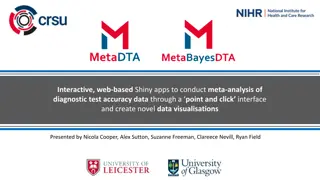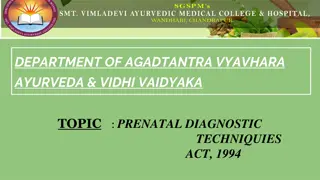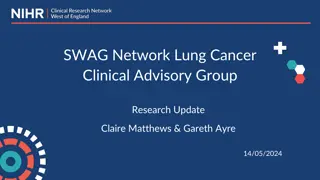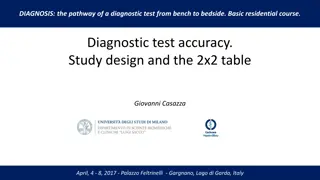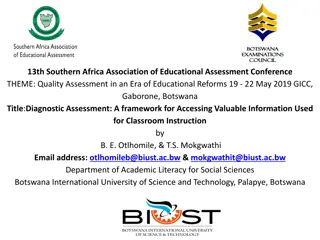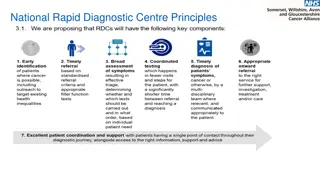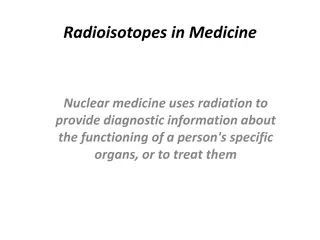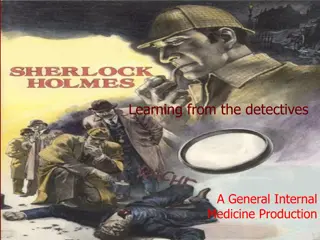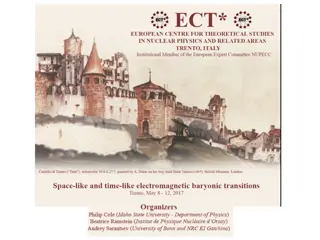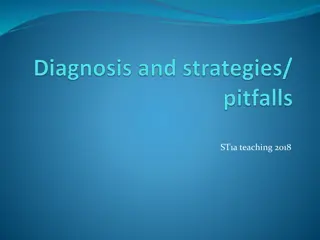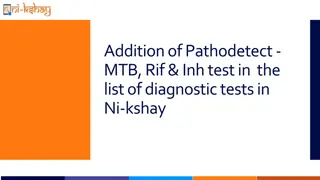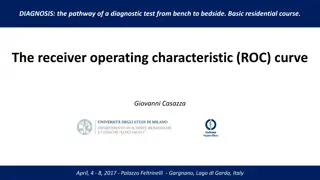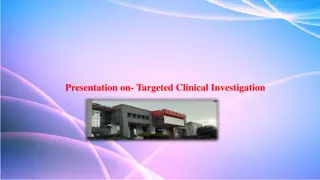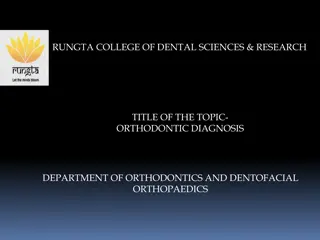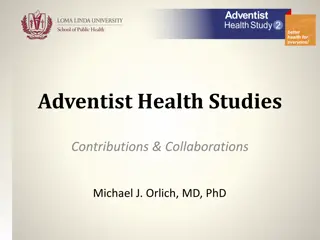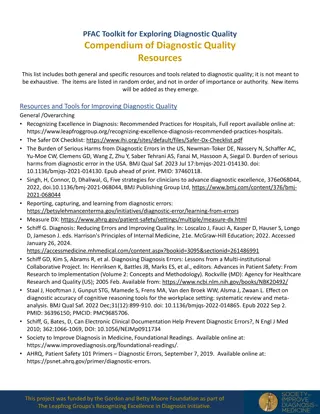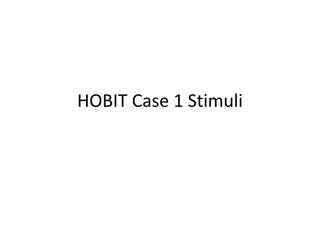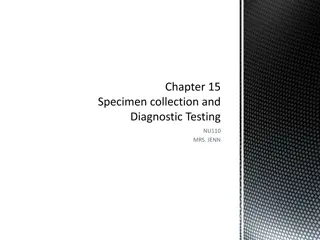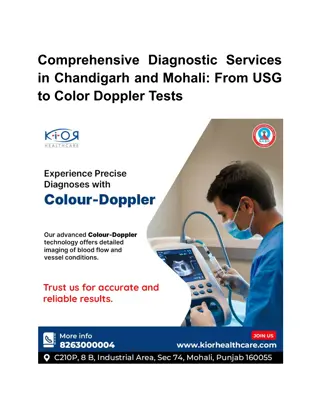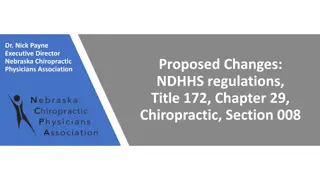In Vitro Diagnostic (IVD) Products Market Size
\u2018Indonesia IVD Market by Product (Kits, Instruments, Software), Technology (Immunoassay, Hematology, Coagulation, Diabetes, Molecular), Application (Infectious Diseases, Cardiology, Oncology), and End User (Hospital, Diagnostic Lab, Home Care) - Forecast to 2029.\u2019\nAccording to this latest
2 views • 4 slides
Mycobacterium Tuberculosis
Tuberculosis is a chronic disease caused by Mycobacterium tuberculosis that primarily affects the respiratory system. This overview covers the epidemiology, transmission methods, causative agents, pathogenesis, diagnostic methods, management, prevention, and control of tuberculosis. The importance o
2 views • 35 slides
South East Asia collagen market
Rapid Diagnostic Kits Market for Indian Ocean Region Countries (France, India, Australia, Indonesia, Singapore, Sri Lanka, Madagascar) by Product (Professional, OTC), Platform (Immunoassay, Molecular), Application (Infectious Diseases, Cardiac, Urinalysis, Cholesterol), End User (Hospital, Diagnosti
0 views • 2 slides
South East Asia collagen market
Rapid Diagnostic Kits Market for Indian Ocean Region Countries (France, India, Australia, Indonesia, Singapore, Sri Lanka, Madagascar) by Product (Professional, OTC), Platform (Immunoassay, Molecular), Application (Infectious Diseases, Cardiac, Urinalysis, Cholesterol), End User (Hospital, Diagnosti
0 views • 2 slides
Enhancing Public Financial Management Through External Audits
Strengthen the performance of the Public Financial Management system by utilizing external audits and international standards. Main entry points for SAIs, diagnostic tools, and challenges in assessing PFM are discussed. Learn how to effectively use diagnostic tools to complement audit work and addre
0 views • 8 slides
Understanding Diagnostic Test Evaluation and Performance
Explore the intricacies of evaluating diagnostic tests, including precision, sensitivity, specificity, and factors influencing test performance. Learn about the purpose of diagnostic tests, examples across various fields, and the types of studies used to assess them.
9 views • 53 slides
Evolution of Radiopharmacy: A Specialized Field in Pharmacy
The evolution of radiopharmacy as a specialty has progressed rapidly since the 1950s, involving the preparation, dispensing, and clinical investigation of radioactive materials as drugs. Radiopharmacy plays a crucial role in the development and use of radiopharmaceuticals for diagnostic, therapeutic
3 views • 53 slides
Future Directions in Laboratory and Diagnostic Testing_ Innovations and Emerging Technologies for Ambulatory Care
Ambulatory care technologies are becoming an essential part of the modern medical scene. One of the top reasons behind their soaring popularity is the great convenience that they afford to patients, in addition to the fact that they can greatly decrease healthcare-associated costs as well. That asid
12 views • 5 slides
Interactive Web-Based Shiny Apps for Meta-Analysis of Diagnostic Test Accuracy
Explore interactive Shiny apps presented by Nicola Cooper and team for conducting meta-analysis of diagnostic test accuracy data with a point-and-click interface. Find educational primers, principles, and tools to enhance evidence synthesis methods and visualization in healthcare.
2 views • 22 slides
Microarray Kits Market
Microarray Kits Market by Product Type (DNA [cDNA, Oligo, BAC, SNP], RNA, Protein, Tissue), Application (Drug Discovery & Development, Research, Diagnostic), End User (CRO, Pharma & Biotech, Academic, Hospital & Diagnostic Lab) \u2013 Global Forecast to 2031\n
10 views • 4 slides
Understanding the Prenatal Diagnostics Techniques Act of 1994 in India
The Prenatal Diagnostic Techniques Act of 1994 in India aims to curb female foeticide and address the dwindling sex ratio by prohibiting prenatal sex determination. This legislation regulates diagnostic methods, prevents sex selection, and focuses on detecting genetic disorders, metabolic abnormalit
0 views • 15 slides
Latest Research and Studies on Lung Cancer - Update May 2024
This research update includes information on national recruitment to lung cancer studies, comparison of national vs. regional recruitment, and detailed descriptions of various studies and trials related to lung cancer. The studies cover areas such as treatment advancements, observational studies, ma
2 views • 13 slides
Overview of Media Studies Disciplines and Historical Development
Media studies is a multidisciplinary field that explores the content, history, and effects of various media, with roots in the relationship between media and culture. Originating in the 1920s, media studies draws on traditions from social sciences and humanities, incorporating theories from discipli
5 views • 18 slides
Understanding Clinical Trials: Types and Designs
Clinical trials are essential research studies that evaluate new tests and treatments to improve human health outcomes. They involve various phases, designs, and purposes, such as treatment trials, prevention trials, and observational studies. Different types of clinical trial designs include experi
7 views • 18 slides
Diagnostic Test Accuracy Study: Design and Implementation
This content delves into the pathway of a diagnostic test from development to clinical application, focusing on the basic concepts of diagnostic test accuracy, study design, the 2x2 table, and key terminology. It discusses the importance of study design in assessing diagnostic accuracy, including fa
0 views • 16 slides
Enhancing Educational Assessment Through Diagnostic Techniques
Diagnostic Assessment (DA) is a valuable technique that provides detailed information about students' knowledge and skills, supporting teachers in identifying strengths and weaknesses for tailored instruction. This approach offers a more nuanced understanding than traditional assessments, contributi
0 views • 20 slides
Prostate Rapid Diagnostic Service Transformation Overview
The document outlines the transformation of the Prostate Rapid Diagnostic Service (RDS), detailing plans, due diligence requirements, implementation timelines, and good practices such as virtual telephone triage systems and use of MRI before biopsies. It emphasizes the implementation of Rapid Diagno
4 views • 8 slides
Diagnostic Specialty Antibodies Market, Diagnostic Antibody, Infectious Disease
Diagnostic Specialty Antibodies Market by Type (Primary, Secondary), Clonality (Monoclonal, Polyclonal), Technique (WB, Rapid Test, IHC, IP), Conjugate, and Application (Dengue, Malaria, Hepatitis, HIV, E. coli , Tuberculosis, Pneumonia, Cancer)- For
0 views • 3 slides
Applications of Radioisotopes in Nuclear Medicine
Nuclear medicine utilizes radioisotopes to provide crucial diagnostic information about the functioning of specific organs and to treat various conditions. Diagnostic techniques in nuclear medicine involve using radioactive tracers that emit gamma rays from within the body. Positron Emission Tomogra
0 views • 19 slides
SWAG Cancer Alliance Rapid Diagnostic Services Implementation Plan
The SWAG Cancer Alliance aims to develop Rapid Diagnostic Services for patients with non-specific symptoms within Primary Care Networks. By 2028, the goal is to diagnose 75% of cancers at Stage 1 & 2, emphasizing personalized, timely diagnoses integrated with existing diagnostic provision. The appro
0 views • 8 slides
Learning from Fictional Detectives for Better Diagnostic Skills
Explore the application of lessons from fictional detectives like Sherlock Holmes to enhance diagnostic processes in medicine. Delve into problem representation, observation, deduction, and clinical reasoning strategies to improve diagnostic accuracy and patient care.
0 views • 68 slides
Hematological Cancer Clinical Studies Update and Recruitment Statistics
Latest update on hematological cancer clinical studies from the SWAG.Network Haematological Cancer Clinical Advisory Group, including national recruitment data, regional recruitment comparisons, open studies, and sample size information for ongoing studies. This comprehensive update covers a range o
0 views • 14 slides
Advances in Baryon Spectroscopy and Hadronic Matter Studies
Discussions at the meeting focused on interpreting HADES results for e+e- and meson production in hadronic reactions, with studies involving proton, pion, light, and heavy ion beams. The role of time-like electromagnetic transitions, baryon spectroscopy, and connecting hadronic matter studies were e
0 views • 12 slides
The Influence of Personality on Presidential Leadership Style: A Case Study of Donald J. Trump
This study examines how personality traits influence presidential leadership styles, focusing on a case study of Donald J. Trump, the 45th President of the United States. It explores the conceptual links between Trump's personality profile and models of political leadership. The research includes a
2 views • 24 slides
Diagnostic Pearls: Occam's Razor vs. Hickam's Dictum in Clinical Practice
Discussing the fundamental principles of Occam's Razor and Hickam's Dictum in medical diagnosis, this content highlights the importance of considering simpler explanations before complex ones (Occam's Razor) and the possibility of multiple diseases coexisting in a patient (Hickam's Dictum). Through
0 views • 57 slides
Enhancing Diagnostic Tests with Pathodetect in Ni-kshay Module
A new test type, Pathodetect-MTB, Rif & Inh, has been introduced for tuberculosis diagnosis in Pathodetect laboratories. This test has been added to the diagnostic tests list in the Ni-kshay module, enabling seamless reporting in TB diagnostic facilities. The process of adding this test, including s
0 views • 10 slides
Understanding Diagnostic Test Accuracy: A Practical Overview
Navigate through the pathway of diagnostic test development, implementation, and evaluation from bench to bedside. Explore the Receiver Operating Characteristic (ROC) curve, the impact of cut-off variations on sensitivity and specificity, and the practical application of continuous measurement in di
0 views • 32 slides
Understanding Targeted Clinical Investigation in Pharmacovigilance
Targeted clinical investigation plays a crucial role in pharmacovigilance by further evaluating significant risks identified in pre-approval clinical trials. This involves conducting pharmacokinetic and pharmacodynamic studies, genetic testing, interaction studies, and large simplified trials to ass
0 views • 12 slides
Diagnostic Approaches in Hematologic Disorders: A Comprehensive Overview
Explore the diagnostic considerations for multiple myeloma, monoclonal gammopathy of undetermined significance (MGUS), and related conditions, including indications for serum protein electrophoresis (SPEP) and free light chain (FLC) testing. Learn when not to order SPEP and FLC, and consider various
0 views • 24 slides
Concentration and Minor Requirements for Bachelor of General Studies (BGS)
Bachelor of General Studies (BGS) students at Northwestern State University of Louisiana must complete a concentration consisting of 36 hours, with a minimum of 12 hours at the 3000 and 4000 levels taken at NSU. The popular concentrations are Social Science, Computer & Natural Science, and Arts & Co
0 views • 9 slides
Orthodontic Diagnosis: Essential Tools and Techniques
This detailed guide covers essential diagnostic aids for orthodontic diagnosis, including case history, general examination, intraoral examination, supplemental diagnostic aids, orthodontic study models, diagnostic setups, facial photographs, electromyography, radiographs, recent advances, and more.
0 views • 39 slides
Exploring Pesticide Monitoring and Contamination Studies in Maine
Mary Tomlinson's work with the Maine Board of Pesticides Control includes past studies on groundwater and surface water monitoring, ongoing monitoring initiatives, and future collaborative studies. The State Law mandates residue surveys to identify possible contamination sources and develop a pestic
1 views • 55 slides
Utilizing Different Samples for Diagnostic Testing in Medicine
The practice of diagnostic testing in medicine goes beyond blood and stool samples. Gathering urine samples, for example, allows healthcare providers to assess various health aspects, such as kidney function, urinary tract infections, diabetes, and more. By examining the color, clarity, odor, densit
0 views • 21 slides
Adventist Health Studies Contributions & Collaborations Overview
Adventist Health Studies have made significant contributions to understanding the health and longevity advantages of Seventh-day Adventists, particularly focusing on vegetarian diets and cardiovascular health. With a history spanning over 57 years and various cohort studies, these studies have provi
0 views • 12 slides
Toolkit for Exploring Diagnostic Quality Resources
A compendium of resources and tools for improving diagnostic quality, covering general and specific aspects. It includes recommendations for hospitals, checklists, research on diagnostic errors, strategies for clinicians, cognitive reasoning tools, readings on diagnostic errors, and more. The list i
0 views • 5 slides
Diagnostic Workup Results for Patient X
The diagnostic workup for Patient X includes various imaging studies such as ECG, CXR, Head CT scan, CT Abdomen/Pelvis, and Repeat CXR. Laboratory results show abnormal CBC values, BMP findings, LFTs, and lactate levels with associated VBG results. Further evaluation is needed based on these results
0 views • 11 slides
Guidelines for Safe and Efficient Diagnostic Testing Procedures
This content provides detailed guidelines and procedures for specimen collection and diagnostic testing in healthcare settings, covering aspects such as patient assessment, specimen labeling, completing diagnostic requisition forms, and specific procedures like amniocentesis, arteriography, barium e
0 views • 21 slides
Comprehensive Diagnostic Services in Chandigarh and Mohali_ From USG to Color Doppler Tests
In modern healthcare, diagnostic services are essential for early detection, monitoring, and effective treatment of various health conditions. For residents of Chandigarh and Mohali, access to high-quality diagnostic facilities has never been easier.
1 views • 4 slides
Building a Food Studies Center at Met College
Establishing a Food Studies Center at Met College, driven by the merging of Food and Wine courses with Gastronomy programs, aims to integrate hands-on and academic approaches to food studies. Drawing inspiration from existing models like the Culinaria Research Centre and the Center for Regional Agri
2 views • 8 slides
Impact of Court Decision on Chiropractic Diagnostic Testing Regulations
The court case of Yagodinski v. Sutton in Nebraska involving expert testimony on traumatic brain injuries by chiropractors has raised questions about the scope of diagnostic testing allowed for chiropractic care. The court ruled that specialized tests used by chiropractors may not be admissible in c
0 views • 8 slides


